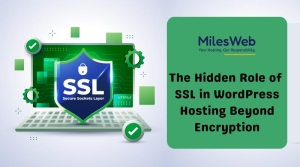The Hidden Role of SSL in WordPress Hosting Beyond Encryption

The Hidden Role of SSL in WordPress Hosting Beyond Encryption
The moment most people hear about SSL certificates, they instantly remember that small padlock symbol in the browser address bar. It’s often reduced to a single task: protecting data exchange between your website and your visitors. However, when using the cheapest hosting for WordPress, SSL does much more in secret. It does a behind-the-scenes job in performance, trust establishment, search visibility, and even how your hosting environment communicates with browsers and third-party services.
If you’re using WordPress hosting plans, understanding SSL beyond the surface-level definition is critical. Let’s explore why SSL isn’t just about scrambling data—it’s about making your hosting environment more robust, more secure, and more reliable.
SSL as a Trust Signal
Encryption is the technical aspect of SSL. The human aspect is trust. Visitors don’t run diagnostics when they hit your website—they search for instant indications of credibility. A missing SSL triggers the “Not Secure” flag in Chrome and other browsers, which is sufficient to make potential customers leave instantly.
In WordPress hosting, where small businesses, blogs, and eCommerce websites live, trust is valuable. SSL works behind the scenes to give people peace of mind before they even read a single word on your website. In a busy online environment, that peace of mind often decides whether a visitor stays to purchase or leaves.
The SEO Advantage: You Didn’t Know Was There
Google has been clear on this: SSL is a ranking factor. While it won’t push your WordPress blog to page one all by itself, it’s a component of search engines’ assessment of your website’s quality and safety.
Search engines prefer to deliver results that won’t put their users at risk. By hosting WordPress without SSL, you’re indicating that your website is behind the times. With SSL enabled, you impart a competitive advantage to your hosting configuration. Combine it with clean WordPress optimization, and you’re not only safeguarding data—you’re safeguarding your search visibility.
Performance and HTTP/2 Compatibility
Here’s an example that most people overlook: SSL is connected with performance enhancements. New protocols, such as HTTP/2, that accelerate the way your WordPress website loads, are required on SSL.
HTTP/2 enables more than one request to be processed simultaneously rather than sequentially. The payoff? Improved load times, more seamless browsing, and happier clients. But none of it works without implementing an SSL. And so, SSL isn’t only protecting your traffic—it’s unlocking functionality within your hosting account.
SSL and E-Commerce Confidence
If your WordPress hosting powers a WooCommerce store, SSL isn’t optional—it’s essential. Customers expect checkout pages to be secure, and payment gateways won’t even integrate without SSL certificates.
But the function is deeper: SSL reassures repeat shoppers. That little green padlock isn’t a browser function; it’s a quiet sales assistant whispering to customers, “This website is safe.” Without it, your store doesn’t just lose trust—it could lose the ability to accept payments altogether.
API Integrations and Third-Party Tools
WordPress isn’t isolated. Most websites depend on third-party tools: CRMs, email marketing tools, payment processors, analytics platforms, and so on. Many modern plugins and third-party tools won’t even run without SSL, since they rely on secure API connections to exchange data safely. Hosting providers like MilesWeb include SSL in their WordPress packages, not merely for “encryption”—but to facilitate seamless communication between your website and the tools you rely on.
Browser Compatibility and User Experience
Modern browsers aren’t cutting any slack—they keep tightening the rules. Chrome, Firefox, and Safari prevents users from visiting non-SSL websites, with some browsers blocking access altogether. For a WordPress website, that means fewer visitors, more bounces, and frustrated users.
By having SSL, your hosting setup sails through these browser tests smoothly. Visitors can enjoy your content, products, or services uninterrupted by warnings. That smoothness—something most website owners overlook—has a direct impact on conversions.
SSL and WordPress Hosting: The Key Connection
In WordPress hosting, SSL quietly holds more weight than it gets credit for.
- Shared hosting environments: Without SSL, websites can risk transmitting data over shared server connections. SSL locks down the data exchanged on your website.
- Managed WordPress hosting: Many providers include free SSL to make it easy to install; however, apart from convenience, it ensures WordPress core updates and plugin communications to be done securely.
- VPS or dedicated hosting: SSL is included in hardening the environment here. It’s a building block of securing your website, as well as the server that your website resides on.
In short, SSL is built into the infrastructure of WordPress hosting—it’s not merely a checkbox option.
Free vs. Paid SSL in WordPress Hosting
You’ve probably seen hosting providers offer free SSL through Let’s Encrypt. For most WordPress websites, these certificates are more than enough.
A free SSL does the job for personal blogs, portfolios, or simple info sites. But when money or sensitive data is involved, paid SSL steps in with warranties, extended validation, and extra support—making it the safer choice for eCommerce and business websites.
The Hidden Layer of Brand Reputation
Visitors notice the padlock right away and often read it as a sign of professionalism. A WordPress website that lacks SSL doesn’t just look outdated—it gives the impression no one is managing it. Pairing SSL with reliable WordPress hosting conveys the visitors that your brand is active, trustworthy, and committed to keeping them safe. That perception alone can make you stand out among competitors who consider SSL as an unnecessary add-on service.
Closing Insights
SSL may have started as a way to encrypt data, but in modern WordPress hosting, it’s a multipurpose tool. It secures, reassures, accelerates, integrates, and enhances.
When evaluating WordPress hosting, look beyond the checkbox of ‘SSL included’. Ask how that SSL unlocks additional advantages—SEO, performance, API stability, and brand trust.
The secret work of SSL isn’t merely about securing your website; it’s about opening doors for your WordPress presence to expand safely and durably. MilesWeb includes SSL with every WordPress hosting plan, so your website stays protected, works smoothly with integrations, and earns visitor confidence from the start.




Leave a Reply
Want to join the discussion?Feel free to contribute!